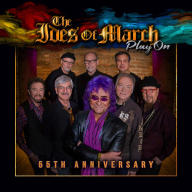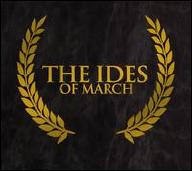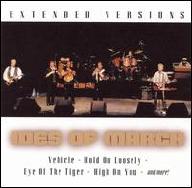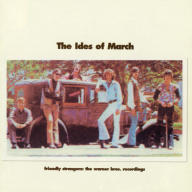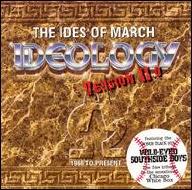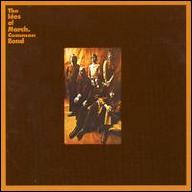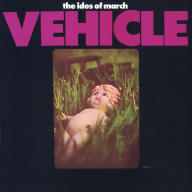The story of the Ides of March began in 1964, when four friends who went to school together in the Chicago suburb of Berwyn, Illinois decided to form a band. With Jim Peterik on vocals and guitar, Larry Millas on guitar and vocals, Bob Bergland on bass and vocals, and Mike Borch on drums and vocals, the group adopted the name the Shon Dels, and in 1965, they released a single, "Like It or Lump It" b/w "No Two Ways About It," on their own Epitome Records label. The group played garage rock with a strong British Invasion influence as well as a dash of folk rock, and in 1966, they changed their name to the Ides of March, after Bergland had read Shakespeare's Julius Caesar in English class. The group's popularity grew after adopting the name, and they made a second single, "You Wouldn't Listen" b/w "I'll Keep Searching," issued by the regional Harlequin Records label in 1966. The A-side was given airplay in Chicago, and Parrot signed the band and reissued the 45 for that nationwide market. "You Wouldn't Listen" rose to number five on the Chicago singles charts, and just missed the Top 40 across the country, topping the nationwide listings at 42. Their second single for Parrot, "Roller Coaster" b/w "Things Aren't Always What They Seem," appeared a few months later, and while the A-side was another hit in Chicago, peaking at number 14 in the Windy City, but it failed to make the national charts. Three more singles for Parrot followed -- 1966's "You Need Love" b/w "Sha-La-La-Lee" and 1967's "My Foolish Pride" b/w "Give Your Mind Wings" and "Hole in My Soul" b/w "Girls Don't Grow on Trees" -- but while the group was still a major draw in their hometown, their ability to sell records seemed in doubt, and they cut ties with Parrot.
Kapp Records released the next Ides of March single in 1968, the moody pop number "Nobody Loves Me" backed with the semi-psychedelic "Strawberry Sunday." It was their first and last release for Kapp, but "Nobody Loves Me" did point to the future with its use of a trumpet in the arrangement. Later that year, with the popularity of horn-based rock bands like Blood, Sweat Tears and Chicago on the rise, the Ides added two trumpet players, John Larson and Chuck Soumar, to give their sound an extra punch. Bob Bergland also began switching off between bass and saxophone, and Larry Millas covered keyboards, guitar, and bass, while another recent edition, Ray Herr, held down vocals, guitar, and bass. This edition of the band landed a record deal with Warner Bros., and their first full-length album, Vehicle, arrived in early 1970. The title track was issued as a single, and it quickly became a smash hit, spending ten weeks on the charts and peaking at number two. Suddenly the Ides of March were stars across the United States, and they soon found themselves touring the nation and sharing stages with stars such as Jimi Hendrix, Janis Joplin, Led Zeppelin, and the Grateful Dead. The group wasted little time cutting a follow-up album, and their second LP, Common Bond, hit stores in 1971. By this time, Ray Herr had left the band (he would later adopt the name Ray Scott and embrace a more country-influenced sound), and while the song "Superman," which bore a certain resemblance to "Vehicle," was released as a single, they enjoyed greater success with the tune "L.A. Goodbye," which took the emphasis off the horns in favor of a sound that recalled L.A. soft rock.
Though "L.A. Goodbye" earned a solid amount of airplay, Common Bond didn't spawn a major hit single like "Vehicle," and Warner Bros. dropped the Ides of March. It wasn't long before they signed a recording contract with RCA Victor, releasing World Woven in 1972. The arrangements eased back further on the horns, the melodies were streamlined a bit, and keyboard player David Arellano was added to the lineup. The updated sound attracted few new fans, and the band dug deeper into country rock influences on 1973's Midnight Oil, also issued by RCA. Sales were disappointing, and the group's busy schedule was taking a toll on their morale; in November 1973, after a concert in Berwyn, the Ides of March broke up. Jim Peterik would go on to form the group Survivor, who hit the charts with "Eye of the Tiger" and "The Search Is Over," and he also enjoyed a successful career as a songwriter, co-writing hits for .38 Special ("Hold on Loosely," "Rockin' Into the Night") and Sammy Hagar ("Heavy Metal").
In 1990, the organizers of Berwyn's annual Summerfest approached the former members of the Ides of March, asking if they would be interested in reuniting to headline that year's event. They agreed, and the lineup of Jim Peterik, Larry Millas, Bob Bergland, Mike Borch, John Larson, and Chuck Soumar took the stage, augmented by Dave Stahlberg on trombone. A crowd of 20,000 fans cheered the group's performance, and it inspired the Ides to make the reunion a going concern, with keyboard player Scott May joining the group on the road. In 1991, they brought out a cassette-only EP, Beware the Ides of March, and the following year, they released Ideology, a collection of fresh material and re-recordings of favorites from their back catalog. In 1997, the Ides brought out another EP, Age Before Beauty, and a collection of their pre-Warner Bros. recordings, Ideology 1965-1968, was issued by Sundazed Records. (Rhino Handmade would follow suit in 2003 with a limited edition two-disc set Friendly Strangers: The Warner Bros. Recordings, that brought together all the material they cut for that label.) The band documented their live show on the 2003 concert album Beware! The Ides of March Live, and in 2005, their profile got a boost when American Idol contestant Bo Bice performed "Vehicle" several times on the show, renewing interest in the original version. In 2008, the Ides were invited to appear on the PBS music series Soundstage, and in 2010 they issued Still 19, which was their first album of fresh material since 1973's Midnight Oil.
The band's original horn section, John Larson and Chuck Soumar, left the lineup in 2011 (Larson was struggling with cancer, and died before the year was out), while trumpeter Tim Bales came on board the same year, and Steve Eisen became their full-time sax player in 2012. 2012 also saw the release of The Lost Tapes, Vol. One, drawn from rediscovered recordings of a concert in Michigan in 1972. A more ambitious archival release appeared in 2015; Last Band Standing collected the bulk of the band's recorded legacy from 1965 to 2010 on four CDs, with a DVD of a 2014 concert also included. Dave Stahlberg bowed out of the group in 2015, and Henry Salgado took his place on trombone. The Ides made a second appearance on Soundstage in 2016 as part of a show dedicated to Midwest garage rock; the show also featured performances from the Shadows of Knight, the New Colony Six, the Buckinghams, the Cryan' Shames, and the McCoys. Along with their busy performing schedule, the Ides of March found time to work on music in the studio, and in 2019, in time to celebrate their 55th Anniversary as a band, they brought out the album Play On, which featured guest appearances from Paul Shaffer, Joe Bonamassa, Mark Farner, and Bo Bice. ~ Mark Deming, Rovi


